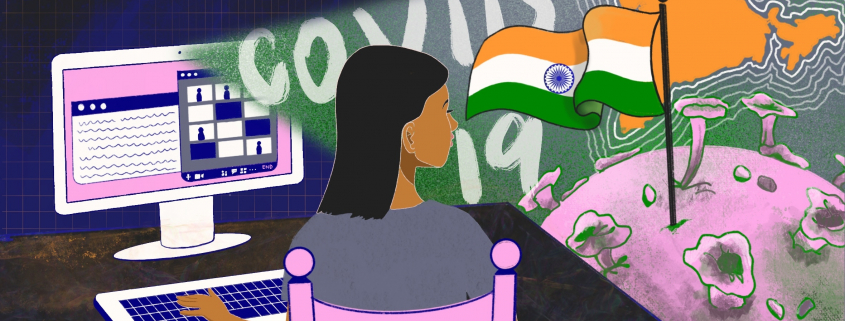Letter from the editor: We must allow ourselves to feel
Opening an email from a professor I had a couple of semesters back asking about how me and my family were doing with the situation in India, I finally allowed myself to cry. It was the middle of finals, and I had been on auto pilot mode for some time.
Sitting all the way in Los Angeles, fully vaccinated since the end of March, I didn’t know I was allowed to feel anything. The ground situation in India had been worsening. Social media was flooded with posts from friends, family and acquaintances looking for hospital spaces and oxygen. Each phone call meant another friend, family member infected and fighting for their life while I stressed over finals and work.
I didn’t think I could break down when I was so privileged.
With over 400,000 cases surging everyday, India’s infrastructure collapsed. Having considered itself successful with its coronavirus response, religious pilgrimages and political elections started up again, and an even deadlier second wave began. As the new variant spreads faster, bodies continue to pile up. Even now, hospitals have no available spaces and coronavirus numbers continue to be underreported.
While keeping up with the constant news cycle and trying to go about my daily life, the past year has numbed me. I find myself detached from everything going on around the world. Instead of taking time to grieve over loss and deaths, I distract myself by focusing on work.
The media cycle has added to my detachment. The focus shifts everyday leaving behind war zones, deaths and other crises for newer ones. For India’s coronavirus situation, the coverage lasted a week and seemed more concerned about what it meant for the world rather than the toll of the virus on India itself.
The lives’ of all my family and friends and the losses they are suffering extended to “what it meant for the United Kingdom’s reopening plan” or criticisms about the government. After a week, it felt like everything was normal. No one was reporting on India so it no longer mattered.
Living in the privileged bubble of USC, everyone was so busy with exams and the end of the semester, something happening halfway across the world did not matter. A few emails from deans of schools extending sympathy and support were the only indication that something far more serious than finals was going on.
As life begins to restart around me, it feels almost impossible to return to the normalcy of the pre-pandemic when so much has changed. Much of the world remains at standstill, with vaccine shortages, unequal health care access and spreading coronavirus variants. It feels privileged to have to worry about getting a perfect grade, scoring an internship or even making sure everything at the Daily Trojan goes smoothly when so much in the world is wrong.
And yet drowning myself in work, stressing over what relatively seems like small problems and taking on more responsibilities is the only thing keeping me sane.
It’s exhausting constantly telling myself that my emotions don’t matter and I am not allowed to feel the way I do because of how lucky I am. Everytime someone asks me how me or my family are doing, I dismiss their concerns by saying both my parents and I are fully vaccinated. As if being fully vaccinated means I am not allowed to be worried.
In reality, I am terrified. I am worried that I can’t see my family or friends and I wouldn’t be able to help them or return home if something were to happen. I feel guilty going about my daily life, dining out or travelling because I know so many people all over the world cannot.
At times being an international student at USC feels like living invisibly. International students are valued for their diversity, the discussion they bring into the classrooms. But when it comes to being aware of what is going on in their part of the world, there is ignorance in the USC community.
As a student journalist, these emotions are intensified by a need to keep covering stories because of how important the work we do is. It also means not taking anytime away from the constant news cycle, always being ready to cover breaking news and not being able to take a break from the screens because someone might need you. Even on the days I feel my worst, I put all of myself into my work because of the responsibility I feel.
Becoming editor-in-chief means the stakes are higher. My responsibility extends beyond a single section or representing a single community. I have a duty to keep the entire USC community informed and engaged. I have a responsibility to make sure all communities feel represented and each student knows their voice matters.
How can I do my job right if I cannot take time off or be honest about my own mental health? How can I encourage editors and staffers to produce their best work and keep the community informed if they feel burnt out because the weight of their responsibilities doesn’t allow them to process their own emotions? In a world where we are already desensitized and disengaged from what is going on in the news, as student journalists it is even more important for us to remain engaged. It is crucial for us to remember the value of each life and not forget what is going on around the world because the news cycle has moved on.
Going forward we need to allow ourselves to honor the way we are feeling and take breaks when we need them. As we transition to different stages and time periods, make a collective return to normalcy and experience diverging circumstances — communication and community will remain more important than ever before.


